Film Name: 捕風追影 / The Shadow’s Edge
Yesterday, I came across a screening time that worked for me, so I didn’t think twice and went to see the upcoming new film “The Shadow’s Edge.”
To be honest, before watching it, I really thought it was probably a bad movie: a co-production between mainland China and Hong Kong, featuring the “veteran-newcomer” pairing of Jackie Chan and Zhang Zifeng with Tony Leung and Ci Sha, and a police-action thriller genre. We’ve seen too many of these half-baked, thin, and uninteresting co-productions in recent years… But to my surprise, the film turned out to be surprisingly decent.
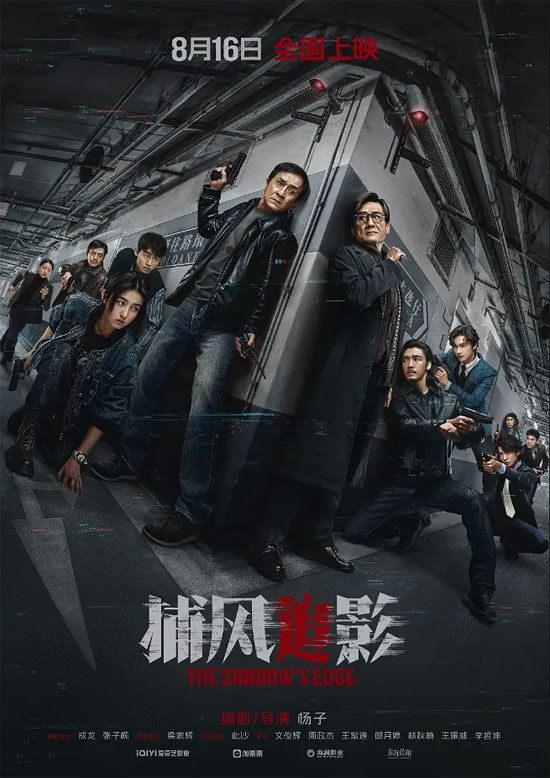
This isn’t to say that “The Shadow’s Edge” is free of the usual flaws of co-productions (it still has its slow pacing and rigid storytelling), but rather that the film largely suppresses these negative aspects. It has action, professionalism, and a smooth, coherent plot—it’s a quality film.
More importantly, the film uses two sets of mentor-apprentice and father-son/father-daughter relationships to clearly depict the complexity of pain, hope, and conflict that arises when two generations transition and iterate.
[Friendly reminder: The following text contains spoilers.]
“The Shadow’s Edge” is adapted from the old film “Eye in the Sky.” It tells the story of Fu Longsheng, the leader of a genius gang of thieves, who commits a crime and then retires. After many years, the tracking expert Huang Dezhong comes out of retirement and leads a group of young people to rebuild the “tracking team” to fight against the other side in a game of wits and courage.
The first surprise this film offered me was its action sequences, which are both visually stunning and well-crafted. They blend the foundational elements of traditional Hong Kong kung fu films with the flashy, modern espionage action style of contemporary films.
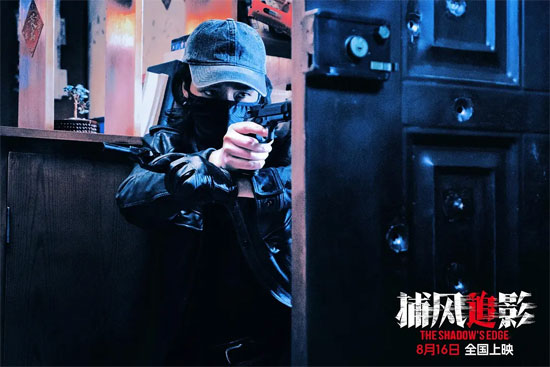
The opening scene where the police and criminals engage in a chase and fight at the first crime scene and the Wynn Hotel is worth mentioning. The action sequences are flawless, likely the work of the Cheng Family Team. What stands out is the seamless execution of costume changes, props, editing, and camera work throughout the sequence, which avoids the dated feel of some Hong Kong films and instead feels clean and crisp, clearly drawing inspiration from international films.
Additionally, the casting in “The Shadow’s Edge” is also impressive—especially the young men in their twenties playing the villains, who are all tall, handsome, and have a solid foundation in action scenes. The leader of the group, with his more angular features, is particularly striking. Watching them fight with such vigor is a pleasure to behold.
Next, let’s focus on the two sets of “clashes and collaborations between two generations” in the film, which I believe are the best highlights of “The Shadow’s Edge.”
One set is between Fu Longsheng, played by Tony Leung, and his adopted sons. They are both emotional step-father and son and mentors and disciples on the path of crime.
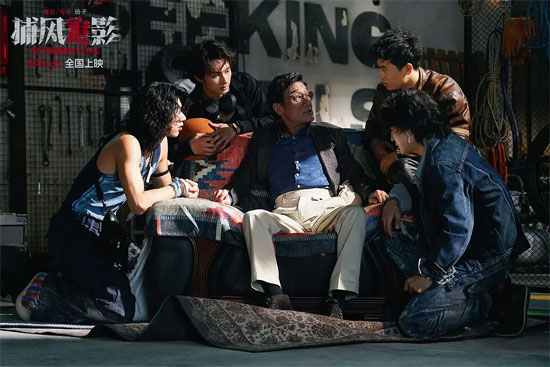
Their tensions stem from differing ambitions in their criminal activities: Fu Longsheng focuses solely on the planned targets, unwilling to take unnecessary risks, while Xiao Xin and the others seek to “kill two birds with one stone,” pursuing greater rewards.
From the results, Fu Longsheng has evaded justice for years by being cautious and leaving room for maneuver. He naturally condemns and disciplines actions that endanger everyone… but in the eyes of his rebellious juniors, the master appears increasingly cowardly and brutal, a relic and burden on the verge of being phased out.
Fu Longsheng was well aware of how the children felt. He didn’t mind if Xi Meng, Xi Wang, and the others had the courage to eliminate him—but only if they truly had the ability to do so. If they acted and failed, he would clean house with all his might. This was the brutal intergenerational transmission of outlaws.
In contrast, the other pair—Huang Dezhong, played by Cheng Long, and He Qiuguo, played by Zhang Zifeng—as the children of an old police officer and his fallen partner, were far more traditional.
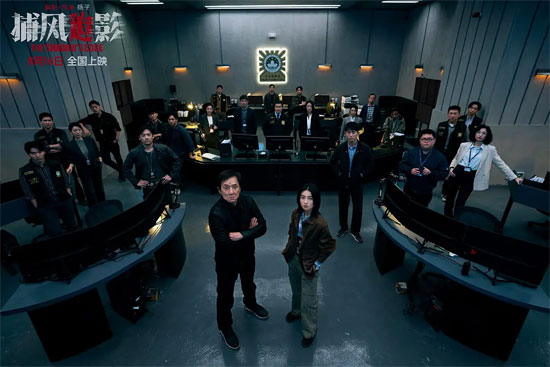
For most of “The Shadow’s Edge,” Huang Dezhong spends his time mentoring the younger generation who still have room for improvement, especially after the bandits disabled the surveillance system, making it even more crucial to follow the experienced Huang Dezhong and rely on traditional, proven methods to lead everyone in catching the criminals.
Huang Dezhong has a particularly deep affection for He Qiuguo, both because she is the child of a comrade-in-arms who needs proper care, and because she has been stuck in a desk job, rarely seen in the field and lacking the typical police demeanor, making her ideal for tracking work.
The generational conflict between the two primarily manifested in their understanding and execution of police duties. Besides patience and restraint, Huang Dezhong also placed particular emphasis on fulfilling his own duties, as he had indirectly caused his partner’s death while saving a child during a mission, and naturally did not want He Qiuguo to repeat the same mistake.
However, if it were merely a matter of elders instructing and juniors accepting, it wouldn’t be considered a process of adaptation and evolution. Therefore, He Qiuguo later explicitly tells Huang Dezhong: “Saving people is the duty of a police officer. Your decision to ‘step out of line’ back then was not wrong. At the very least, you shouldn’t continue to blame yourself for doing the right thing.”
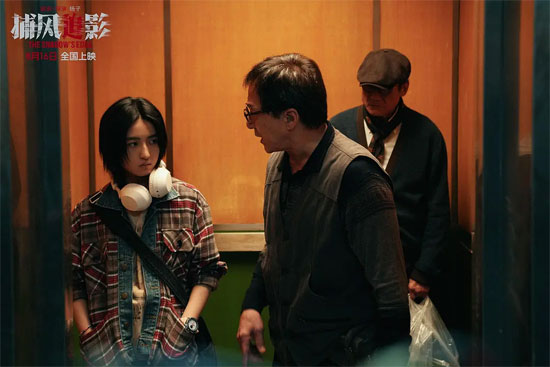
Given these characteristics, the most compelling part of “The Shadow’s Edge” is the middle section of the film.
During this period, both Huang Dezhong and Fu Longsheng made the right strategic decisions based on their authority (Huang Dezhong established the “Pet Paradise” to begin investigations, while Fu Longsheng temporarily cut ties with Xi Meng and his group to operate discreetly). The two sides also engaged in direct confrontations with both open and covert tactics.
Meanwhile, their juniors began to act freely while respecting their elders. Thanks to He Qiuguo’s quick thinking and reckless advances, the police were able to get close to Fu Longsheng and set up a trap. Xi Wang and others then used Fu Longsheng as bait to set up a trap within a trap.
However, “The Shadow’s Edge” is overall inclined toward the new and progressive, believing that the young will eventually replace the old—for instance, Fu Longsheng’s inability to manipulate computers and other new technologies, and his reliance on tangible cash, which ultimately exposed his whereabouts. Similarly, when the police department reactivated the AI system “Spicy Girl” to swiftly analyze and deduce Fu Longsheng’s escape route, even Huang Dezhong couldn’t help but exclaim, “It’s too fast!”
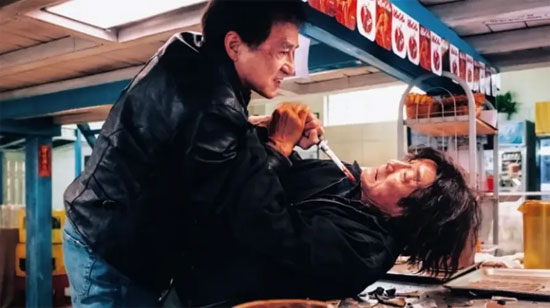
So, based on this premise, if Huang Dezhong and Liang Jiahui had fewer fight scenes in the film, the effect might have been better: we believe that the big brothers are still in top form, but they don’t need to fight throughout the entire film, or rather, audiences now prefer to see the big brothers with more nuance and depth in their “aged” portrayals.
This brings us back to the issue I mentioned at the beginning, which is a common flaw in many (co-produced) Hong Kong films today: they often fall into a hesitant yet overly intricate pacing, particularly evident in the forced action sequences and drawn-out dramatic scenes. While “The Shadow’s Edge” has been optimized fairly well overall, similar issues still surface in the latter half of the film.
If the film could eliminate at least half of the action scenes featuring Jackie Chan and Tony Leung, simplify some of the later plot twists, and reduce the runtime to under two hours, it would be much more enjoyable.
Please specify:Anime Phone Cases » The Shadow’s Edge 捕風追影 2025 Film Review: The growing pains and complexities of generational transition